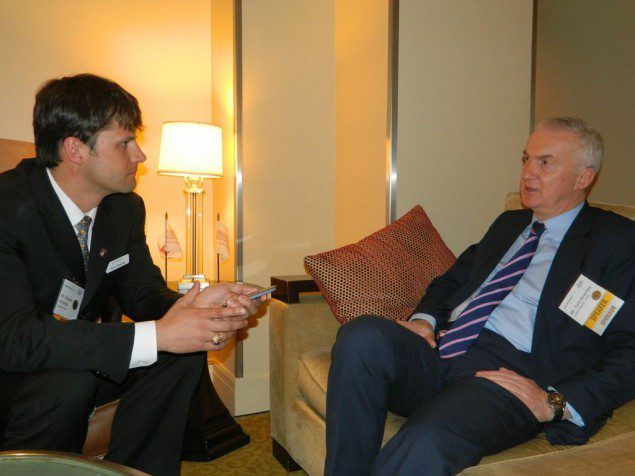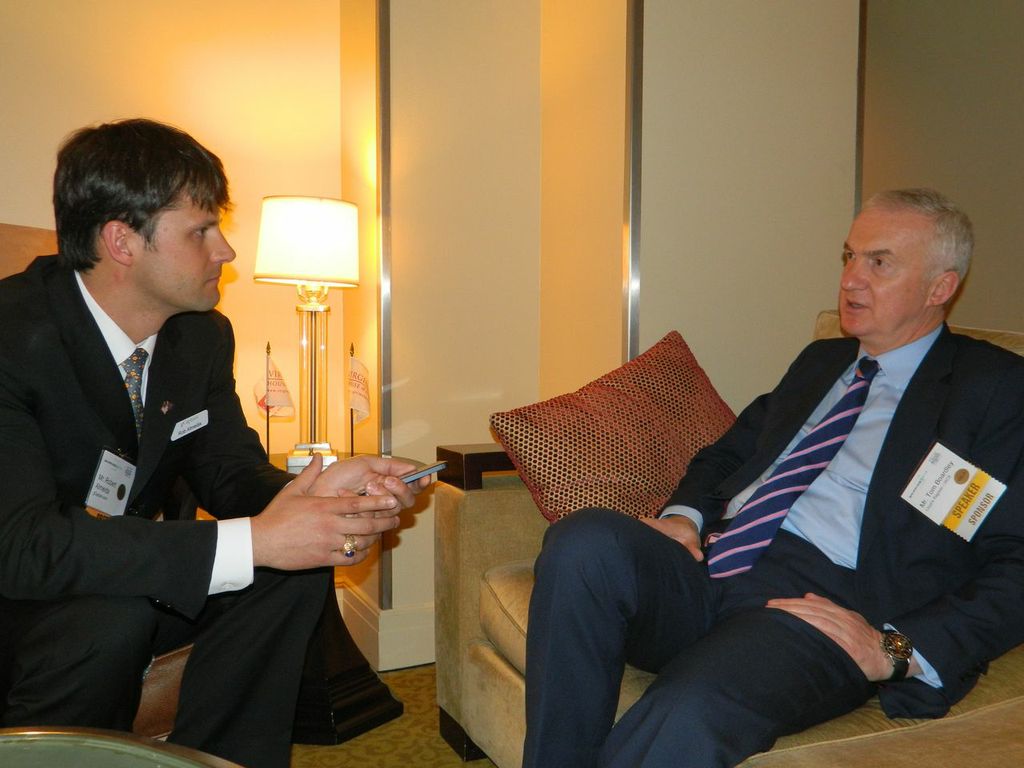Tom Boardley, Image: Lloyd’s Register
While at the Connecticut Maritime Association Conference in Stamford, Connecticut, I met up with Tom Boardley, Marine Director at Lloyd’s Register.
Headquartered in London, Lloyd’s Register (LR) is the world’s oldest ship classification society and a member of the International Association of Classification Societies. LR’s marine business is their largest division with 8,000 vessels in class.
Tom Boardley has worked in the shipping industry since graduation from university in 1978 when he joined P&O. Working in liner management and agency operations, he represented P&O in the UK, Taiwan, Korea, Japan and Australia. In 2004 he became head of NYK Line’s European Container activities based in London. Most recently he was responsible for CMA CGM’s UK based operations, involving liner, agency and technical management responsibilities. He took up his current role as Marine Director at Lloyd’s Register in April 2009.
Here’s what he had to say.
RA: Tom, great to meet you. Besides heading up the marine business at Lloyd’s Register, I hear you do a fair bit of work within the International Association of Classification Societies (IACS) as well?
TB: I’m IACS’ chairman at the moment, which is a twelve-month appointment ending in June. So that means, in addition of doing my work at Lloyd’s Register, I represent IACS at various functions, and I also do some of the internal work such as developing their agenda.
RA: So you would be working over at the IMO quite a bit I’d say.
TB: Spending time at the IMO, with the EU, with some of the other industry associations, yes, trying to progress the overall shipping agenda.
RA: What is the shipping agenda these days?
TB: Well, a lot of it relates to coping with regulation, particularly things like ballast water, air emissions, where we have forthcoming legislation, but the implementation is proving quite problematic.
So we’re working there with other industry associations trying to figure out which protocols should be adopted then working with the IMO to get them adopted.

RA: There seems to be a huge amount of debate surrounding the ballast water treatment legislation.
TB: There’s a huge amount of debate over it and the convention hasn’t even come into force yet. What we’re seeing at the moment is the US has brought in their own ballast water regulations, having their own sort of challenges in terms of what their implementation program should be, apply rules, and the discussion we had this morning between INTERTANKO and the US Coast Guard even trying to interpret legislation and practices is something they have to work on.
RA: How well is the engagement going between Class and the IMO?
TB: It’s very close. We are, in fact, the technical advisors to the IMO so that they will look to the classification societies and IACS to provide a lot of the resources in terms of trying to figure out 1) What the regulatory programme should be, and 2) Once you’ve figured out what you’re trying to achieve, then as you said, framing implementation plans, phasing, and all that sort of thing.
RA: Are stakeholders united over what needs to be done in terms of ballast water treatment?
TB: Many of the stakeholders are convinced about what they want, and that’s a delay in the implementation of the legislation because technically, we’re just not ready for it.
Obviously, that’s a very difficult sell from a political standpoint.
Particularly with air emissions, where the legislation has already come into force, and will take affect from a certain date, and we can’t see that going back. Then it’s a question of trying to figure out if any technical solutions will come in time, or whether it’s simply a question of spending more money to buy cleaner fuel, which is gasoil.
RA: On the subject of air emissions, people have been very hesitant toward the scrubber solution because it’s so expensive. It seems to me that it’s a good solution if the economics make sense.
TB: I think the thing about scrubbing technology is that land-based scrubbing is quite mature. It’s been in force in many installations for many years. The marine-ization of it, in confined spaces, and being maintained by people who perhaps aren’t sophisticated service engineers, and the disposal of the waste generated is all proving quite difficult.
A lot of the trials of scrubbers failed not because of the technology, but because of the supply chain. Particularly the waste disposal.
RA: What does the waste consist of?
TB: Urea.
Obviously, if you take sulfur out of the smoke, you gotta do something with it. There are new systems coming in which may offer new solutions, but at the moment, I think the core technology is quite understood. but often its in very confined spaces because there simply isn’t much space around the funnel to install it, and to get it handling the waste and maintaining it is a more complex type of kit seafarers aren’t used to dealing with.
So, many people are shying away from scrubbers thinking there will be a leap frog into a new kind of solution such as cleaner fuel like methanol or LNG. Also, until they clear what the monitoring and enforcement pact is, the fear is that if you go early, then you might end up spending a lot of money. If the enforcement is patchy or not well-implemented, then those that don’t, might end up being better off than those that do.
That’s the dilemma for shipowners. They want to do the right thing, but they are afraid if they do, it will be the wrong thing.
RA: It’s an expensive time to be doing this sort of thing in the shipping market.
TB: Scrubbing technology is not cheap. I think if it was cheaper, it would be easier.
RA: What is it, about $1 million?
TB: You’re talking about a million dollars per unit. Depending on how long the ship is going to be in the ECA, or special ECA, it may be cheaper just to burn gasoil. In fact, some of the operators are saying, “well, if the shippers will pay, we’ll just burn gasoil.”
RA: That brings up another issue on the supply of gasoil.
TB: That could change market demand quite considerably and force up the prices of diesel. There are a number of factors to take into account.
RA: When it comes to the implementation of LNG into our industry, do you see the widespread implementation of LNG-powered deep sea shipping?
TB: I have my doubts, but certainly it will become a very significant in coastal and regional shipping.
RA: Do you see the US moving aggressively toward LNG-powered Jones Act shipping in the next few years?
TB: Undoubtably, and I think you’re seeing that with ferries.
We’ll reach a point where you’ll see all the North American and European ferries built to be powered by LNG. I think that’s almost inevitable unless there’s another fuel like methanol that comes along and takes its place because it solves the emissions problem with lower CO2 and zero SOx.
RA: Going back to my conversation with Tim Protheroe last year, he spoke about the burden of regulation on the seafarer. How have things changed over the past year?
TB: That remains a very big issue. The latest regulation we have is the Maritime Labour Convention. That obviously is good for the seafarer as it looks out for their well-being, but yes, we are spending a lot of time working with shipmanagement companies and shipowners trying to figure out how some of this regulation will be implemented in practice, how it will be enforced, what equipment is available, what systems are available, and how to train the crew on the new equipment.
It remains a constant source of concern to shipowners.

 Join The Club
Join The Club












